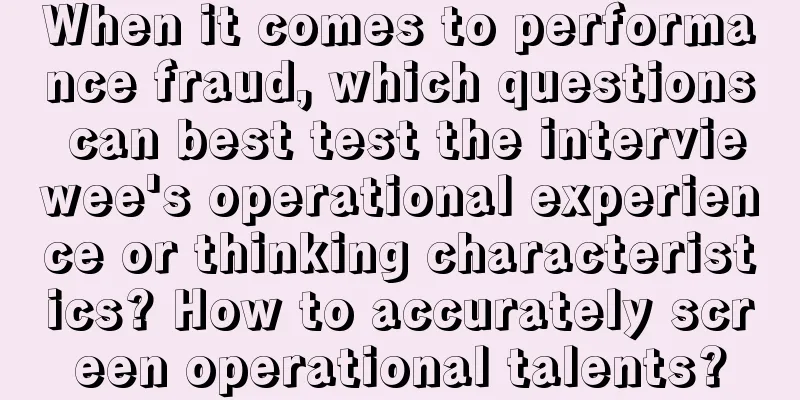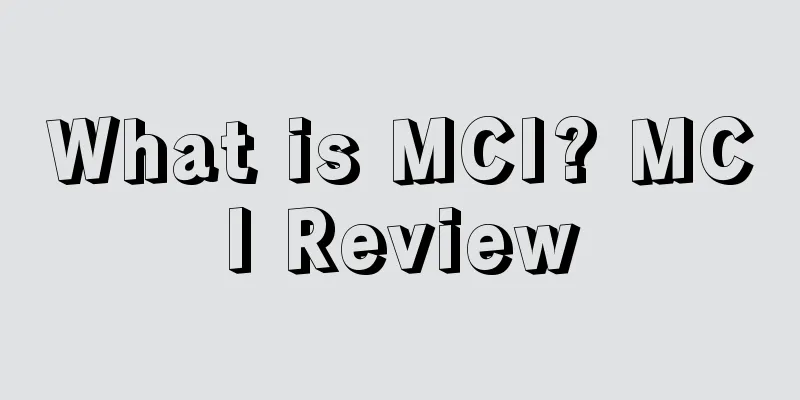|
The company’s team is not large, with only three or four operations staff at the moment. I’d like to ask how everyone recruits outstanding operations talent?
First of all, unlike technical positions, it is difficult to see the level of operations in an interview. Performance and experience can be faked. However, the operation salary is high, and the product promotion cost is also high, resulting in a high cost of trial and error. In addition to money, more important is time and energy.
As for the characteristics of the talents I like: being proactive, conscientious and responsible, being down-to-earth, meticulous and ethical, and having visual marketing thinking. These are not things that can be fully understood in an interview. The only thing that can be understood is operational experience, but experience can be good or bad, true or false, so I would like to raise three questions. Please give me some advice.
1. During the interview process, which questions can best test the interviewee's operational experience or thinking characteristics (practical and proactive, responsible, marketing thinking)?
2. How do you select and train outstanding talents and managers in your company? (resume screening plan, probationary screening test plan, and post-training plan)
3. For a small team, what kind of people are most suitable to recruit and train?
"Wonderful Reply"
Anonymous user Approved by: JeffBezos001 Hello blogger, before answering the question, let me introduce myself first: I am a cross-border e-commerce manager, currently mainly responsible for personnel management, recruitment and training of branch companies, leading a team of more than 10 people (8 people in operation). Therefore, I have considerable experience in resume screening, probationary period assessment, and post-training, and I hope it will be helpful to you.
1. Interview questions: Seven steps: If you are not familiar with the interview process in advance, you can write down the questions one by one before the interview to stay calm.
Before the interview: Don't rush into the interview. Let the applicant fill out a personal information form first to check whether the information before and after is consistent, as well as personal marital and family background, etc.; by looking at the completeness of the personal information form, you can roughly know whether you will spend half an hour or an hour interviewing this person.
Personal self-introduction and job description overview: check the applicant's logic (the applicant must have a clear mind), work experience (whether it is consistent with the company's needs), and interspersed questions: sales situation, advertising situation, who is responsible for product image requirements, etc. (test whether communication is in place, whether the applicant can get the leader's key points, and what the visual requirements are. If the answer is irrelevant, then there will be communication problems after being hired).
What challenges did you encounter in your previous work, but you successfully solved them through your own efforts: Looking at the experience of solving problems and the attitude when facing problems can show whether the candidate has strong stress resistance. Startups need talents with strong problem-solving ability.
Reasons for leaving: personal reasons (further asking whether the problem has been solved, whether there will be any impact, etc.), company reasons (whether communication and resolution were attempted, further determining whether the person has a problem-avoidant or problem-active personality).
Career planning: Applicants who answer that they want to work in management are more idealistic and ambitious and are worth cultivating.
The applicant's assessment of his or her self-discipline, stress resistance, learning ability, and personality, and corresponding examples: This can show whether the applicant has a clear understanding of himself or herself, and secondly, whether he or she is in line with the company's talent training plan.
Final questions: Ask about work skills (table functions, etc.), interests and hobbies, work distance, treatment at the previous company, and expected salary at the new company.
Summary of the interview process: During the interview, the interviewer's feeling is also very important. If you are satisfied with the applicant in all aspects, you can do a basic knowledge test (prepare the test paper in advance, and put the content you want to know in the form of questions for the test - usually includes the following modules: account security, basic operations, after-sales customer service, FBA delivery, advertising knowledge, etc.; it can be formulated according to the actual needs of the company. The questions for assessment will be different for different working experience periods, and roughly 2-3 sets of test papers are prepared).
Interviews are usually divided into preliminary and re-examinations. The current situation is more suitable for direct interviews, skipping the re-examination stage. If you meet a suitable candidate, make an offer on the spot to retain talent.
2. Screening and training management personnel: Prerequisite: Team leaders need to have the same goals as the company and have a sense of identity and belonging to the company's policies and strategies.
Resume Screening Program - Three Checks: Check name, phone number, social platform (method: Qichacha, browser; check whether there is a registered store); Check the previous company’s situation (company size, operating model – boutique, distribution, fine distribution; see if it matches your own company); Check graduation certificate (method: free query on China Higher Education Student Information and Career Center; this step is usually left for verification on the day of employment. If you want to verify before the interview, you need to ask the interviewer for the certificate number in advance. It is not recommended to verify before the interview, and usually people dare not forge it)
Probationary period assessment - three tests: Phase 1: Company rules and regulations, product knowledge and platform knowledge, arrangement of basic work (link optimization, store decoration, data collation), reporting and work plan (ensuring communication, basic skills, self-discipline); Phase 2: Challenging task assignment and assessment (e.g. advertising optimization, inventory redundancy, product promotion, etc.); The third stage: Assess as a formal employee (sales target, KPI assessment, etc. The first two stages are the most basic, and the new employees trained in this way will have higher loyalty). During the probation period, appropriate training (account security, rules and regulations, products, etc.) is required to allow new employees to quickly integrate into the team.
Late stage training - three points: First: Only when you have a consistent level of obedience, sense of belonging, sense of purpose, and identity with the company culture, and are willing to take on greater workload and responsibilities, can you go further with the company;
Second: delegate power downwards and unify power and responsibility. Do not delegate power only to employees, or only take responsibility, as this will not give full play to the subjective initiative of employees.
Third: clarify the direction of employee training and provide training support, whether it is management or grassroots employees, operations, advertising or product selection, focus on training in one direction, and then let the old bring in the new, and continuously train more outstanding talents, so that the team becomes stronger and stronger and invincible. The people who are finally trained should be comprehensive talents who can stand alone in the Amazon field, actively deal with and solve problems, continuously achieve sales targets, improve sales targets, have strong learning ability, and dare to challenge unknown fields.
Finally, in summary, the length of experience required for applying for a job at different stages is different. If it is a new store and you are not in a hurry to get results, half a year or one year of experience is enough, which is suitable for long-term training;
If it is a new store, and it is urgent to achieve results, the applicant should have more than 2 years of boutique experience, and reach a consensus during the interview. The probation period is 2-3 months and the performance is the assessment. If the performance requirements are not met, the applicant will not be hired;
Because if a new employee with more than 2-3 years of experience runs a new store, but is required to produce results within 3-6 months, it is easy for the employee to leave. Currently, it usually takes more than half a year or a year for new employees to make breakthroughs and achieve results, so as a company leader, you also need to give employees a certain amount of time to grow.
Practice is the only criterion for testing truth. I hope you can also find talents suitable for your company.
Anonymous user Agree from: Li Zi Feng Yan 1. First of all, salary If the job posting says 4k to 10k, then there are basically no excellent operators. At least you may encounter one with a small chance of starting at 8k. (No way, no way, do you want to find excellent potential stocks among interns? Or look for experienced operators)
2. Truly excellent people don’t really need a full set of mechanisms to accomplish their goals. Because they have strong self-drive and motivation. Generally, such people are very particular about efficiency and quality. Of course, they also need a balance. If they pursue efficiency, they are generally impatient (not extroverted or introverted!!), and they also hate others dragging their feet. Therefore, when asking about operations, you can ask him what things in his past work experience made him angry and why. Then see how he solves these things. (Bad operations will only complain and pass the buck, while good operations will take the initiative to solve problems. As long as they can solve the problem, they are good operations, and they don’t care whether the process is arguing or gently persuading...)
There are relatively few operators who pursue quality too much. Looking at the table analysis he has done in the past, is it particularly refined, the data is clear, the table is formed in one go, or does it need to be returned repeatedly to modify the table content? ? What are the general reasons for modification? This can simply show how operators pursue efficiency and quality.
Be responsible and ask him what problems have occurred in the past and how they were solved, such as overlapping coupons? Wrong ASIN entered into the warehouse? Etc.
3. Look at the sense of achievement of operation I have seen very strong operations (such as a new product that achieved daily sales of 1,000 orders within three months). They are extremely persistent and pursue achievement in explosive sales. They will set goals for themselves, such as a small goal of 600,000 US dollars in monthly sales for a new store in half a year, or 100 orders per day for a new product within a month. They feel very accomplished and confident, and feel that they can do it (unless the product fails and there are a large number of returns). Therefore, you can ask the operator what makes him feel accomplished in life, what he feels accomplished at work (such as having a good relationship with colleagues? Being good at work?) or even in games. Why do they have such a sense of accomplishment? It is difficult and troublesome to find a good operation. But in any large company, there are often only a few most important and core employees. Others can be replaced at will, but if the core employees are replaced, the company will bleed heavily...
4. Planning Operations will also have their own plans. At each stage, you should be clear about your shortcomings and the points you want to break through. When recruiting, you should also focus on the direction. Small teams need more all-rounders. For example, such an employee is still relatively rare. You just throw him there and the mechanism will work.
https://www.wearesellers.com/question/32324. The reality is that most employees still need external push, and they need to supervise and follow up on the assigned tasks themselves, otherwise they will not be able to complete the tasks at all. This is why we need SOP process planning, which is to take reality into consideration.
To be honest, I have been working in operations for two years. I have met many operations and assistants around me. Most of the assistants changed their careers before they lasted half a year, and most of the other operations are still doing nothing and thinking about life in confusion. You still have to slowly find a good operation. In the process of finding, if you meet other operations, as long as you can get along well with them, it’s fine. Having a complete SOP process is the right way to plan.
The last point is Performance can be used as a reference, but it is definitely not absolute. Except for the big blood seafood product Jixiang Sanbao, the promotion of most products is still quite standard. Not everyone is BS. It is important to see how the operation breaks the situation when facing different products. (Can you say that the violent S orders and 3C operations of advertising to promote products are definitely good and the other is definitely bad?)
Cross-border Barley - 8 years of cross-border experience As the business manager of Amazon, when recruiting experienced operations personnel, how can you quickly understand his level without being considered as trying to copy their operations ideas?
As a team without the endorsement of a big brand, even if our main business is developing rapidly or we are the hidden champion of the category, we are still limited in the recruitment process. After interviewing hundreds of job seekers after the initial screening by HR, I found that some excellent talents with business capabilities do not necessarily have good language expression and communication skills. At the same time, it is difficult for them to let down their guard and show whether they match the team in the limited interview time. Therefore, I hope to share my interview framework and thoughts, so that excellent operations can get the desired offer more smoothly, and at the same time, it can also allow the thirsty and capable teams to find partners for common progress.
First, I will show the interview framework and general ideas, and then give my own suggestions to people at different levels (this article is mainly for senior operations). Of course, if you are new to the industry, I can provide some test answer templates and resource sharing for some regions. I also wish you to grow into an operation with a basic salary of over 10,000 yuan soon~
Basic information:
1. Self-introduction? Express yourself from three dimensions: personal information, project summary, and person-job matching
(PS: Resume optimization is equally important. Some excellent people have been rejected by HR. You can send me a private message for resume templates.)
2. Reasons for leaving? Judging points are work attitude, stability, career planning, values, honesty, etc.
(It cannot be shown in the resume, it tests your language ability, you can memorize it in advance)
Personal ability:
1. Work performance? Introduce general information from the team and personal situation, and display corresponding data based on job responsibilities, including but not limited to: product line, average customer price, sales, ranking, advertising fee, profit point, click-through rate, conversion rate and other basic information. Judge from the dimensions of authenticity, data acumen, and thinking logic of presentation and display.
(Companies will think: unlike pure technical positions, it is difficult to see the level of an operation position during an interview. Performance and experience can be faked, but the operation salary is high, and the current cost of launching new products is also high, resulting in a high cost of trial and error. In addition to money, the more important thing is the cost of time and energy. Senior talents will think: After sharing the information, the other party starts taking notes and recording the operation process one by one. Then they unilaterally ask all kinds of questions, such as what specific products are, what is the average customer price, and what is the gross profit? The job remuneration has not been discussed in detail, are they just getting something for free?)
This topic is currently the main pain point, but it cannot be avoided unilaterally. Both parties need to establish initial trust based on the actual interview scenario. As a corporate recruiter, you need to grasp the scope and depth of the data. As an individual applicant, you need to pay attention to logic and communication skills. Only in an equal two-way selection relationship can you judge the match between the two parties. 2. Project achievements? Show from the dimensions of personal skills, work value, project thinking, work role, etc. (It is not a must, but for talents who want to seek a higher base salary, it is worth polishing this part of the content)
Job matching:
1. Human efficiency management and team building
2. Business planning and product line layout
3. Performance management and incentive programs
4. New product promotion ideas
5. Advertising architecture capabilities
6. Inventory planning logic
7. Product selection ideas or market demand analysis
8. Off-site operation skills
9. Off-site promotion resources
......
Matching is very important. You should pay attention to the matching between the company's category and your past experience, as well as the matching between your ability and the job responsibilities the company is recruiting. Matching is very important, but improving yourself is more important. Add stars manually.
About the author: 8 years of experience in cross-border e-commerce, operator of billion-level stores, believes in "altruism and self-interest", pursues "teaching to promote learning", and hopes to make friends with people who share the same frequency.
Anonymous user Many job experiences at Amazon are indeed easy to fake, because many team members can easily understand each other's work content, and some people will claim other people's achievements as their own during interviews. But if you are familiar with operations, it is still easy to distinguish the truth from the false.
If you don’t understand operations, you should actively participate in the interview, because the interview process can also allow you to learn a lot of new things. If your boss doesn’t understand Amazon at all and is a hands-off boss, even if his operations are excellent, he will suffer losses because he cannot control the overall situation. Here are your questions:
1. When recruiting people, you must have the confidence to keep trying and failing. If this one doesn’t work, just switch to the next one. In this industry, capable people often don't stay long, and those who seem to be active thinkers are not good at practical operations and will be left on the bench. To be safe, it is recommended that you recruit employees who are introverted and can be patient. They don't have to be familiar with all aspects of operations, but they must be the kind of people who can concentrate on researching products and can execute your orders. If you want to test the applicant's operational experience and thinking characteristics, you can design the following questions (the more specific the questions, the better):
a. Ask him/her to talk about his/her previous work experience: what categories of products he/she operated, how much sales he/she made, how long it took to promote a product, etc.
b. What tools can be used to search for keywords
c. What functions can sellers with brand registration enjoy?
d. How to deal with negative reviews and how to accumulate positive reviews
e. How to advertise: How to operate SP/SB/SBV/SD and other advertising types
f. How to prepare for Member Day/winter peak season
g. How to do competitive product analysis
h. What are the promotional activities on the site?
i. How to do off-site promotion
j. How to clear out unsold products
2. How to screen and train management personnel:
If you only recruit three or four operations personnel, it would be best for you to become a manager yourself, communicate more with colleagues/peers, and become an experienced operation yourself.
a. Resume screening: Try to screen candidates with higher education/other expertise. For example, candidates with high scores in CET-4 and CET-6/experience in PS and other design work/experience in video editing/skilled in both English and a foreign language/students with strong logical thinking and a passion for data analysis, etc.
b. Probation period: Can fulfill the job duties diligently/have basic communication skills/have basic work experience/be down-to-earth/obviously make continuous progress/have visible work results/can take the initiative to take responsibility - basically can become a manager.
c. Post-training: provide independent product selection opportunities; provide management positions; bring people together to communicate more with awesome peers; provide paid learning materials, etc.
3. Team training:
Small teams can often only recruit operators who are not very experienced. In this case, the personal quality of the employees themselves is the key. Sometimes people with strong learning ability will progress very quickly. As long as you can provide him/her with enough product operation opportunities + training and learning opportunities to continuously increase knowledge, he/she will not be worse than those with the most experience. In addition, try to recruit operators with different skill points, so as to make full use of their respective advantages and save costs.
Anonymous user
1. During the interview process, which questions can best test the interviewee's operational experience or thinking characteristics (practical and proactive, responsible, marketing thinking)? Look at the size of the first few companies. If it is a large company, you will be tested (you may not have much targeted experience, they rely more on the team, and when you have difficulties, you may think back to your teammates instead of trying to solve it yourself. If you can't figure it out, then think about it as a team). Small or medium-sized companies generally just look at the performance and then refer to the general oral description, and then summarize your own experience and judgment - large companies are too rule-bound, and the people leaving are a bit messy. Capable people are reluctant to really leave, unless there is a problem with the company or the boss, but their division of labor is a bit clear, and it is not necessarily all good. Performance and so on basically depend on the team, and there are very few people with many skills.
However, small and medium-sized companies will basically take care of the overall situation. Those who learn better than those in large companies will basically take the initiative to learn and solve problems. However, it still depends on how you position the employees you need to choose the people you interview.
Being down-to-earth and proactive can only be known after the interview. It cannot be seen on the surface, but you can see the situation in the first few months after joining the company.
Responsibility can deceive people. Let the salary decide. If our company does not make empty promises, employees can feel at ease.
Marketing thinking: There is no marketing thinking. Just ask them what they think about the product. If you ask too many questions, they will be disgusted. You can only ask them what they think about a few products. It is not recommended to ask other questions. If you can tell them the market profit of this product, whether it will make a loss or more money, they basically still have thinking.
2. How do you select and train outstanding talents and managers in your company? (resume screening plan, probationary screening test plan, and post-training plan) Many companies out there actually only look at performance, but we look at ability and enthusiasm. How should I describe performance? We train new people together, and the performance of those who have been satisfied with the past is very good, because there are too many things involved. For example, how do you know for sure that his performance is not due to the trend, or that the product suddenly became popular? This is a product selection issue (a distribution or fine distribution company). So it still depends on enthusiasm and ability. Many are willing to do it. For example, there are a lot of them anyway, so I won’t say what I think. Mine is just suitable for our company. I remember that our company used to train people with good performance, and then..., if their character was not good, they would be fired. Fine distribution companies are basically the same, they rely too much on luck, and cannot prove their ability.
3. For a small team, what kind of people are most suitable to recruit and train?
Look at your own company. To put it bluntly, you can't tell whether a company wants to train people by looking at the recruitment process. The company should not be stingy, and should be realistic. They should receive all the wages they deserve. Just give them a paycheck on a regular basis to make them satisfied. I've seen companies that have been in operation for more than ten years, and the longest time an old employee has worked there is only 9 months. The boss is unpopular and stingy. Do you want to train your own people?
No matter how much he earns, it is not worth having a few confidants to make him feel at ease. Therefore, he is willing to pay all the wages that should be paid, and he is not stingy during the Chinese New Year and other festivals. If he makes 100 yuan in profit, he is willing to give out 40 yuan to make everyone happy. Even when he makes a loss, he still does not deduct money from his salary to make you live happily. If you are happy, you will also work hard for the company. If I give you 5,000 yuan, and your salary is still 5,000 yuan after working for half a year, then what are you learning so much for? Your mind is not here, and you will not devote yourself to your work wholeheartedly. You will also think about running away.
To sum it up in one sentence, I will give you enough salary and you will devote yourself to the work and I will give you enough trust. You make me rich and I will make you rich. If you can't do it, you can leave.
Anonymous user Approved by: JeffBezos001 1. During the interview process, which questions can best test the interviewee's operational experience or thinking characteristics (practical and proactive, responsible, marketing thinking)?
1. Experience fraud: Ask whether you accept background check;
2. Falsification of performance:
Method 1: Check whether various performance data match. For example, click-through rate can be derived from ACOS, CPC, and average order value. Generally, it is difficult to match randomly made data. Method 2: Establish a comprehensive probationary assessment plan in advance and communicate with the interviewer to see how the interviewee responds. Even if there are some who slip through the net, generally speaking, you can tell how good the person is after one month of probation.
3. Work attitude: This is generally difficult to tell. The interviewer will certainly prepare questions in advance about this aspect. You can infer this by asking about your opinion on the work environment of your previous company.
4. Work ability: In addition to the usual questions, they may also ask about English proficiency;
5. Marketing thinking:
Amazon has more and more restrictions now, and there are fewer and fewer operating methods on the site, so I usually ask:
1. New directions for site operations, such as what new features have been added to the site, what they do, and how to use them;
2. What are the off-site operation methods and how to cooperate with the on-site operation;
3. Other marketing methods, such as the creation of a group of stores that sell premium products, privatization of traffic, customized after-sales services, etc.;
This type of question has basically deviated from the traditional Amazon operations recruitment questions, and it mainly depends on the interviewer's divergent thinking;
To sum up:
Amazon operations interviews are different from some IT industries (which are obviously technical) and cannot be directly assessed with test questions, so the early interviews are more about the match between the person and the team and their development potential;
There must be a matching probationary assessment plan and training plan to minimize the sunk costs of the interviewer/company;
2. How are the outstanding talents and managers in your company selected and trained (resume screening plan, probationary period screening test plan, and later training plan)
Excellent operation: Excluding some objective reasons, general performance speaks for itself;
Managers: Generally speaking, middle-level managers (team leaders, supervisors) are promoted gradually from operational positions; performance is more important in the early stages, while management ability is more important in the middle and late stages.
This question is not covered much, so skip it.
3. For small teams, what kind of people are most suitable to recruit and train?
This depends on the boss's style. If the boss himself started out as an operator, and then slowly built up his business, then he would start his own business. At this time, the recruiters are there to help him, and they are mostly hired as tools. If the boss is new to the industry and doesn't know much, then the recruiters need to first recruit a supervisor, and then build a team around the supervisor and the boss' ideas.
wangyoulange Approved by: JeffBezos001 Hello, OP, to answer your question:
1. During the interview process, which questions can best test the interviewee's operational experience or thinking characteristics (practical and proactive, responsible, marketing thinking)?
As an operations director, I have interviewed many people. Although resumes and performance records can be falsified, I can ask more detailed questions. For example,
-What is the biggest difficulty you have encountered in your career? How did you overcome it? (See if he has the ability to look back and summarize)
-What aspect do you think your previous company could have done better to improve its performance?
-What are your hobbies? (People who like sports or raising animals are generally more responsible.)
-If your boss asks you to do something that no one in the company has tried before, would you accept it? (To see if he has a pioneering spirit)
In addition, you must not listen to what the person says specifically, but look at his way of thinking and expression to see how logical he is and whether he is a good thinker.
When it comes to performance and operational capabilities, you need to ask more detailed questions. For example
-How is the performance of the most successful product you have operated? (ranking, sales, order volume, gross profit) See if he has a global view
-How do you usually build an ad? Do you have any experience?
-When encountering operational difficulties, how do you solve them? Are there any channels for learning?
2. How do you select and train outstanding talents and managers in your company? (resume screening plan, probationary screening test plan, and post-training plan)
- When it comes to resume screening, don’t place too much emphasis on academic qualifications, but basic English skills are a must. It’s still important to focus on personal qualities; being able to endure hardships and being enterprising are more important.
-Probationary period screening and testing program, we will generally carry out it in stages, and during the probationary period, the assessment is generally on basic entry-level operational capabilities.
1) On the third day, you will be assessed on whether you can write a listing that meets Amazon’s requirements, including the title and BP. There must be no grammatical or spelling errors and the listing template must be filled out correctly.
2) On the fifth day, the ability to combine and split listings.
3) Day 7: The ability to find keywords.
4) On the 10th day, you need to be able to analyze data in tables and calculate profits.
-Post-training program
Personally, I think that small companies must have salary advancement plans, such as a salary increase for level A and a salary increase for level B. Other things like company values and leadership skills are not necessary.
3. For a small team, what kind of people are most suitable to recruit and train?
Of course, you have to be hardworking and honest.
I hope my answer can help you, and I wish you a big sale! 8-pack abs Eddie Peng • 2022-08-11 09:36 -If your boss asks you to do something that no one in the company has tried before, would you accept it? (To see if he has a pioneering spirit)
Does this sentence represent whether one has a pioneering and enterprising spirit?
Isn't it about weighing the costs before making a choice?
MrbeHalo - Likes to communicate about Amazon There were more than 80 people in the company before, and we were interviewing people every day for all kinds of positions. Let me share some of my superficial views.
First of all, the questioner may feel that sometimes there is no standard to feel what kind of person you want, which is normal, but after many interviews, you will naturally have a framework in your mind about which people you don’t want and which people you don’t want, but you must have a courageous heart to challenge, which is roughly as follows
1. The questioner must know what his current situation is like, what the future will be like, what stage the product layout is currently in, and what the future plans are. These must be very clear and quantifiable. In this way, you will know what kind of talents you need to help you realize these plans, because recruiting people is to help you solve problems, not to recruit people with problems;
2. When recruiting people, I personally suggest that people with a degree or above will be better. It’s not that I discriminate against people with less than 2 degrees, but people with a degree or above will not be too bad at their work, and may even surpass the boss’s thinking in some aspects. Because it is difficult for these people to get into a key university, so when these people work, they show learning and comprehension abilities that ordinary people cannot keep up with. People with a degree or above will generally show a state of learning, progress, and a desire to develop. This is why the first point mentioned above requires you to be very clear about your future plans and what you want;
3. Through the second point, you can filter out many water people. Generally, good talents must have the ability to think independently. Then you can give a plan and ask him how to answer your question. If they are all the same, then it is up to you to judge. If some people dare to oppose your ideas, or dare to refute you, don't get angry first, listen to his explanation carefully. To make progress, people must learn to accept being overturned. Overthrow is not necessarily a good thing, at least it will cause a collision of your own views, so that new ideas will be born. Of course, forget about those who are emotional;
4. Many excellent talents have their own personalities, and sometimes managers find it more difficult to manage them, because to be honest, managers don’t know how to manage them well, and they may even have deficiencies in ability, vision, strategy, etc. If excellent talents work for a period of time and don’t get any hope, they may leave soon. This is why the first point is that the subject must be very clear in his heart, stick to the right path, and find ways to achieve it, and excellent talents will follow your direction and work hard to do well. This is also the biggest profound experience in the past. There will be a common goal, which means growing together;
5. Small teams can also achieve great things. Excellent top talents are hard to find, but as long as the salary and commission are in place, and especially if the company has a clear overall plan and obvious stamina and potential, then truly good talents will feel that your company is full of hope when they come to your company, and will naturally work with you. After all, no one can resist money and hope.
I didn't express some details according to the questioner's ideas, but I would like to share some of the things I thought of that I summarized before. One more thing to add is that it is better for the company to have an administrative staff to deal with interview and recruitment issues for you every day. And the administrative staff is not simply waiting for people to submit resumes, but to discover talents according to your needs. Yes, that's right, it is to take the initiative to find people, and the hardware must be grasped. If it is not sure, it must be approved by you. Just like this, the administrative staff will not be able to get anything done as soon as possible. I was like this before, so the administrative staff is actually the busiest person in the company, because this kind of work can be stopped at will, but if you can't find anyone to come, the administrative staff will be under pressure. Don't do everything yourself, spend your time wisely.
Also, it is better to have nothing than to have something unqualified. Don't settle for less. If you invite the God of Plague in, that can be really fatal. You have to be on guard against the God of Plague every day.
Anonymous user 1. During the interview process, which questions can best test the interviewee's operational experience or thinking characteristics (practical and proactive, responsible, marketing thinking)?
Operational experience should start from some relatively collective and small actual cases, such as what situations some accounts encounter and how to appeal; what words to choose in the advertising process; how to catch up with sellers efficiently and quickly; has he summarized the color preferences of foreign customers, etc. If he has practical experience, his answer will be different from those who only have theoretical knowledge, and you can tell it at once.
Responsibility. If it is convenient, you can talk about his family situation, his friends, his past hobbies, and after talking about them, you will know his living environment and have a pretty good understanding of him. You can also ask him about his choices when there is a conflict between him and his employees or the company's profits. For example, if he sells a very good product and the boss asks several other colleagues in the company to sell it, ask him what he thinks about this matter, whether he considers the overall situation or not.
Marketing thinking, take a specific product and look at the marketing methods and channels he plans.
However, according to our company's many years of experience, those who are particularly good at dealing with people generally have average performance. On the contrary, those who are not easy to get along with, who like to argue and care about things, usually have very good performance.
2. How do you select and train outstanding talents and managers in your company? (resume screening plan, probationary screening test plan, and post-training plan)
There are resume screening and post-training. Some people are suitable for management but not for operations. Some people are very good at operations but just don’t have the management pattern.
3. For a small team, what kind of people are most suitable to recruit and train?
This question is too big and not a good one. Every company has different recruitment standards and requirements. Just like finding a girlfriend, some people think that it is best to find a virtuous one, while others think that they must find a beautiful one to be pleasing to the eye.
In short, find someone who is suitable for your company's development, and of course, he must be able to help you make money in the end. For example, there is someone who can help you make 200,000 a month, but your colleagues don't like him, and he always argues with you and doesn't take you seriously, and he may even secretly open a store outside; there is a person who can only make a few thousand or 10,000 a month for your company, but he is honest and you and your colleagues like him. You have to choose one to stay. Will you choose this person who makes you uncomfortable but can help you make 200,000 a month, or this person who makes you comfortable but can only help you make 10,000 a month?
Anonymous user Agree with: 8-pack abs Eddie Peng My personal opinion is as follows:
1. During the interview process, which questions can best test the interviewee's operational experience or thinking characteristics (practical and proactive, responsible, marketing thinking)?
----Generally speaking, I mainly talk about how the other party promotes the product (marketing ideas), and then give a few practical questions to see the other party's sense of responsibility and initiative, such as asking what should I do if I can't find a clear person in charge? What should I do if I blame each other for development and operation? How to solve it when I encounter difficulties? etc. Setting up some targeted problems can roughly show a person's sense of initiative, responsibility and promotion ideas.
2. How do the outstanding talents and managers in our company screen and cultivate them (resume screening plan, probation period screening test plan, post-training plan)
---Resume is an important aspect. The key is to see whether the logic of the resume is clear and whether some important results are attractive. Of course, it is best to look at the platform by the way. Many of them are the capabilities of the platform rather than individuals. During the probation period, clear results should be given, such as how much growth the goal is, and how much profit it is. Based on this indicator, it is evaluated based on the actual performance of this indicator. Later training will only be used if it feels okay in the early probation period. It depends on what content the other party lacks, mainly depends on how much the company has accumulated, and then supplement it in a targeted manner based on the actual situation of the employees.
3. For small teams, what kind of people are most suitable to recruit and train?
----The probability of a small team recruiting good operations is relatively small, so we can only try our luck. In other words, why do good people come out to find jobs? If they do well in the original company, many people are still unwilling to come out and do it again. After all, operations require accumulation. Most of the people we recruit are those with potential, but if we did not perform well in the past, we can make up for this through some of our own advantages so that new employees can grow rapidly. When hiring potential employees, it mainly depends on whether they are down-to-earth, how they think, and how they express themselves well.
If you want to add one, it is to be as interesting and lively as possible. After being with some more dull people for a long time, it is actually very boring.
Anonymous user For recruitment, I can give you some suggestions:
Judging true or false, this question is actually very simple. You can ask them to list more successful links and say various data, corresponding rankings, order volume, profit margin, etc. These data have rich experience in operations, and basically a little calculation can determine whether they are true or false. There are also issues related to subsequent operations. If you have any questions, you can make a simple record and check it.
1. During the interview process, which questions can best test the interviewer's operational experience ability or thinking characteristics (earth and proactive, responsible, and marketing thinking)
Be down-to-earth and proactive, and responsible. This is difficult to judge if it is the first time meeting. However, you can discuss the problems and solutions you have encountered, whether you have led the team, and the collaboration between the team.
As for marketing thinking, this is simply about operational capabilities and store layout. It can be asked to give some examples of store construction and the decisions based on the reasons for these operations. These are roughly basic judgments;
2. How do the outstanding talents and managers in our company screen and cultivate them (resume screening plan, probation period screening test plan, post-training plan)
Resume screening, this depends on the needs of the company, and there is no standard
Trial period: This company can set a KPI based on sales
Post-stage training plan: I have less contact with this, because generally, there is a team leader to lead the company, and then provide feedback and coordination. Our more resources are more inclined to the team leader or above, and then let the team leader or supervisor implement it again
3. For small teams, what kind of people are most suitable to recruit and train?
If you plan to cultivate it, the most important point is the character of this person, followed by his logical thinking and comprehensive ability
If your character is not up to standard, you must not need this. Amazon has a lot of core data that cannot be leaked. If your character is not good, once you leave the company, it is likely to cause a lot of additional impact and losses to the company.
Don't know anything - Amazon 10 years of operational experience To be honest, the interview is difficult now. If you ask too many questions, the other party will think you are placing information. If you ask less, you don’t know the other party’s level, so you must simply and concise the questions. It is best to throw out three questions that the company currently encounters. If the other party has 1 to 2 replies, you can consider it if you can give a satisfactory reply.
What kind of people are most suitable for recruitment depends on your company positioning. Some companies like to train themselves slowly and have a better training and promotion system because such employees will be more sticky; some companies like to see results quickly, so they need to recruit experienced ones.
In short, in the current market environment, you are selecting employees and employees are also selecting companies. The company's own company's welfare and benefits work environment must also have advantages.
|










